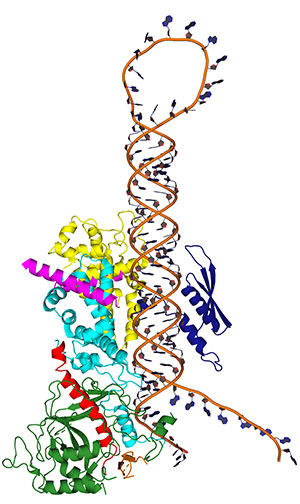Narry Kim
microRNA: Tiny regulators with big roles
microRNAs are small noncoding RNAs involved in virtually all aspects of animal development and diseases including cell differentiation, cell proliferation, cell death, energy metabolism, and antiviral defense. Tight control of microRNAs is critical for normal functioning of cells, and the dysregulation of microRNAs is often responsible for human diseases. Our lab has made contributions to the current understanding of how microRNAs are generated and controlled, by elucidating the mechanism of microRNA biogenesis and identifying several key factors in the pathway, including DROSHA, DGCR8, LIN28, and TUTases. We have also been investigating the function and regulation of microRNAs in cancer and stem cells in hopes that our studies will provide new opportunities for cancer treatment and stem cell engineering.
 DROSHA
DROSHA
 DICER
DICER
RNA modifications: The tail wagging the dog
RNA modifications often determine the function and fate of the RNA. Detecting and analyzing such modifications is thus crucial in our understanding of RNA-mediated gene regulation. We discovered that microRNAs are uridylated or adenylated at the 3’ end and that these 3’ tails regulate the biogenesis and stability of microRNAs. More recently, we developed a technique called TAIL-seq that allows the genomic scale investigation of mRNA tails. Using this new tool, we discovered novel types of mRNA tails and we are currently investigating their functions in the context of development and diseases.
RNA binding proteins: The essential partners
RNAs never stay alone but instead partner with RNA-binding proteins that dictate the activity, stability, and localization of the RNAs. We are developing new tools to investigate the RNA-protein network, with mass spectrometry and sequencing techniques. Untangling this complex network will advance our understanding of the functions and mechanisms of RNAs in post-transcriptional gene regulation.
Viruses and vaccines: RNAs as invaders and defenders
For viruses to replicate their genome and evade their host’s defense system, it is crucial to manipulate the RNA pathways. We are working on viruses that cause major global health issues. In particular, we are currently focusing on coronaviruses to understand their RNA replication and gene expression, to help the ongoing global efforts to combat SARS-CoV-2. In addition, we are investigating viral mRNA stability control, which can provide the basis for the improvement of mRNA vaccines and therapeutics.

 Center for RNA Research
Center for RNA Research